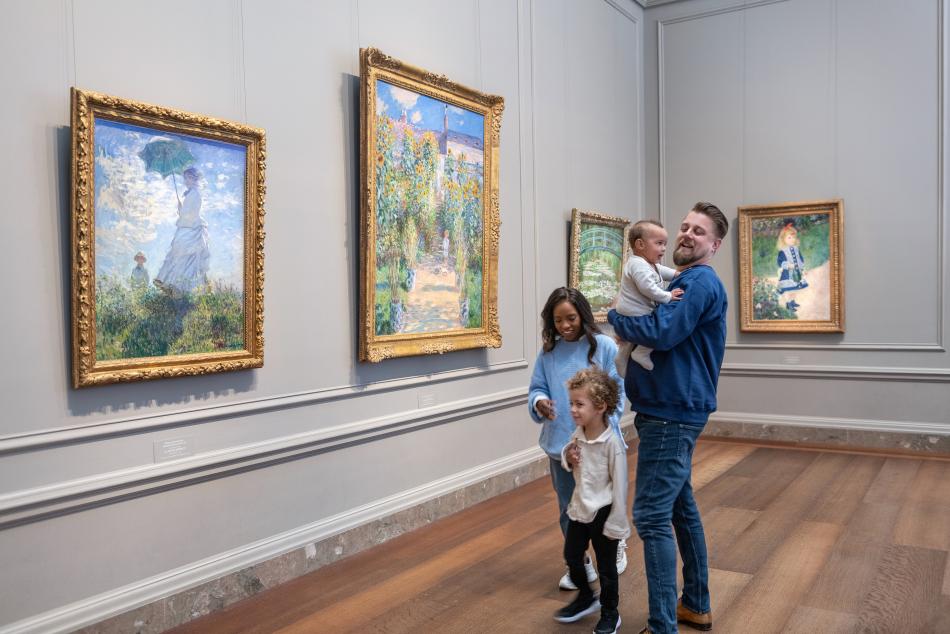En route pour la pêche (Setting Out to Fish)
1878
John Singer Sargent
Painter, American, 1856 - 1925

En route pour la pêche depicts a scene in the quiet fishing village of Cancale, on the north coast of Brittany, France. Against the broad beach at low tide, the town's quay and lighthouse, and cloud-filled blue skies, a group of women and children set out to gather fish and shellfish from shallow pools for their evening dinner. The figures, arranged along the light-dappled shore like figures on a classical frieze, are followed by several more people descending the slipway. John Singer Sargent's impressive composition and deft brushwork endow the popular, but often overly sentimentalized, 19th-century subject of everyday peasant life with an unprecedented freshness.
While this painting gives an impression of spontaneity and facile execution, Sargent devoted an extraordinary amount of effort to preparing it for the 1878 Paris Salon, a highly regulated annual exhibition. The young artist understood the conservative nature of the Salon and therefore executed the canvas as formally and tightly as possible given his training. Even before the Salon closed, the painting had found a patron, marking the second sale of Sargent's career.
Born to American parents in Florence, Italy, Sargent studied in Paris in the 1870s at the prestigious École des Beaux-Arts and with the fashionable French painter Carolus-Duran. During these formative years before his rapid rise to fame as a portraitist, Sargent loved to sketch the sea and coastal life while traveling with his family. The artist began to develop En route pour la pêche, along with a related work in the Museum of Fine Arts, Boston, at age 21. These were his first genre paintings (scenes of everyday life) and, along with their many preparatory works, constituted his first large body of work devoted to one locale.
Artwork overview
-
Medium
oil on canvas
-
Credit Line
-
Dimensions
overall: 78.7 × 122.9 cm (31 × 48 3/8 in.)
framed: 117.16 × 161.77 × 13.97 cm (46 1/8 × 63 11/16 × 5 1/2 in.) -
Accession Number
2014.79.32
Artwork history & notes
Provenance
Admiral Augustus Ludlow Case to Daniel Rogers Case, 1893; 1917 to The Corcoran Gallery of Art, Washington; acquired 2014 by the National Gallery of Art.
Associated Names
Exhibition History
1878
Salon de 1878: 95e Exposition Officielle, Palais des Champs Elysées, Paris, 1878, no. 2008.
1903
The Thirteenth Annual Exhibition of the Society of Washington Artists, Corcoran Gallery of Art, Washington, 1903, unnumbered catalogue.
1925
Memorial Exhibition of the Works of the Late John Singer Sargent, Museum of Fine Arts, Boston, 1925, no. 14, as Oyster Gatherers of Cancale.
1936
The main Currents in the Development of American Painting, Virginia Museum of Fine Arts, Richmond, 1936, no. 88, as The Oyster Gatherers.
1952
Sea and Shore, Norton Gallery and School of Art, West Palm Beach, 1952, no catalogue.
1954
Sargent, Whistler and Mary Cassatt, Art Institute of Chicago; The Metropolitan Museum of Art, New York, 1954, no. 40, as Oyster Gatherers of Cancale.
1959
Loan Exhibition. Masterpieces of the Corcoran Gallery of Art: A Benefit Exhibition in Honor of the Gallery's Centenary, Wildenstein, New York, 1959, unnumbered catalogue, repro., as The Oyster Gatherers of Cancale.
1964
The Private World of John Singer Sargent, Corcoran Gallery of Art, Washington; Cleveland Museum of Art; Worcester Art Museum; Munson-Williams-Proctor Institute, Utica, 1964-1965, no 4, as The Oyster Gatherers of Cancale.
1966
Past and Present: 250 Years of American Art, Corcoran Gallery of Art, Washington, 1966, unpublished checklist.
1968
From El Greco to Pollock: Eaerly and Late Works by European and American Artists, Baltimore Museum of Art, 1968, no. 83, as The Oyster Gatherers of Cancale.
1976
Corcoran [The American Genius]. Corcoran Gallery of Art, Washington, 1976, unnumbered catalogue.
1982
Americans in Britanny and Normandy, 1860-1910, Pennsylvania Academy of the Fine Arts, Philadelphia; Amon Carter Museum, Fort Worth; Phoenix Art Museum, National Museum of American Art, Washington, 1982-1983, no. 12, as The Oyster Gatherers at Cancale.
1986
John Singer Sargent, Whitney Museum of American Art, New York; Art Institute of Chicago, 1986-1987, unnumbered catalogue, as The Oyster Gatherers at Cancale.
1992
Lasting Impressions: American Painters in France, 1865-1915, Musée Américain, Giverny, 1992, no. 56, as Oyster Gatherers of Cancale.
1997
Uncanny Spectacle: The Public Career of the Young John Singer Sargent, Sterling and Francine Clark Art Institute, Williamstown, 1997, no 3, as Oyster Gatherers of Cancale.
1998
John Singer Sargent, Tate Britain, London; National Gallery of Art, Washington; Museum of Fine Arts, Boston, 1998-1999, no. 2.
John Singer Sargent, Tate Gallery, London; National Gallery of Art, Washington; Museum of Fine Arts, Boston, 1998-1999, no. 2, as Oyster Gatherers of Cancale.
2003
The Impressionist Tradition in America, Corcoran Gallery of Art, Washington, 2003-2004, unpublished checklist, as The Oyster Gatherers of Cancale (En route pour la pêche).
2005
Encouraging American Genius: Master Paintings from the Corcoran Gallery of Art, Corcoran Gallery of Art, Washington; Museum of Fine Arts, Houston; Parrish Art Museum, Southampton; Mint Museum of Art, Charlotte; John and Mable Ringling Museum of Art, Sarasota, 2005-2007, checklist no. 43 (shown in Washington only).
2007
Impressionists by the Sea, Royal Academy of Arts, London; Phillips Collection, Washington; Wadsworth Atheneum Museum, Hartford, 2007-2008, no. 46, as Oyster Gatherers of Cancale.
2008
The American Evolution: A History through Art, Corcoran Gallery of Art, Washington, 2008, unpublished checklist.
2009
Sargent and the Sea, Corcoran Gallery of Art, Washington; Museum of Fine Arts, Houston; Royal Academy of Arts, London, 2009-2010, unnumbered catalogue.
2013
American Journeys: Visions of Place, Corcoran Gallery of Art, Washington, 21 September 2013-28 September 2014, unpublished checklist.
Bibliography
1947
Corcoran Gallery of Art. Handbook of the American Paintings in the Collection of the Corcoran Gallery of Art. Washington, 1947: 62.
1959
Corcoran Gallery of Art. Masterpieces of the Corcoran Gallery of Art. Washington, 1959: 59, repro.
1998
Kilmurray, Elaine, and Richard Ormond, eds. John Singer Sargent. Exh. cat. Tate Britain, London; National Gallery of Art, Washington; Museum of Fine Arts, Boston. Princeton, 1998; Washington, 1999: no. 2, repro.
Ormond, Richard, and Elaine Kilmurray. John Singer Sargent: Figures and Landscapes, 1874-1882. The Complete Paintings, Volume IV. New Haven and London, 2006: no. 670, repro.
2011
Cash, Sarah. "John Singer Sargent, En route pour la pêche (Setting Out to Fish). In Corcoran Gallery of Art: American Paintings to 1945. Edited by Sarah Cash. Washington, 2011: 31-32, 36, 37, 142-143, 268, repro.
Inscriptions
lower right: JOHN S. SARGENT. / PARIS 1878
Wikidata ID
Q20188839

